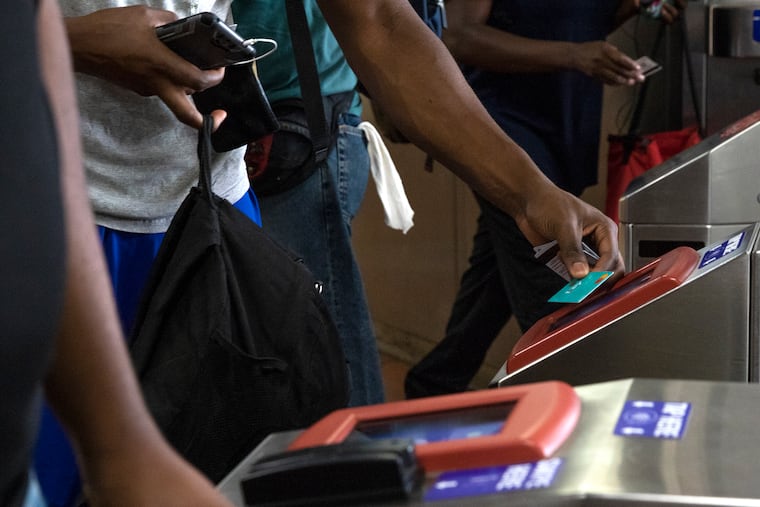More Philly workers could soon commute on SEPTA for free
After finding strong demand for a free transit-pass employee benefit, SEPTA is expanding the Key Advantage program.

Since Penn Medicine, Drexel University and Wawa began handing out free all-access SEPTA passes to employees in May, more than 7,500 people have signed up for the benefit, the transit authority says — 49% of those eligible.
On Tuesday, SEPTA announced that it would expand the Key Advantage program to any business with 500 or more employees that wants to offer it, and opened a web portal for applications and inquiries. A new round of monthly passes is scheduled to go live Sept. 1.
“The program has generated a lot of interest from other employers, and we are excited to be able to extend the benefits to more organizations,” Leslie S. Richards, SEPTA general manager and CEO, said in a statement.
SEPTA hopes to rebuild ridership decimated by the pandemic while helping businesses stay competitive for employees in a still-robust job market, and perhaps even lure people back to the office.
“How people use transportation is a deeply habitual thing,” said Erik Johanson, director of operating budgets at SEPTA. “What we’re trying to do here is work with institutions to, in our mutual interest, rebuild that habit of using transit again in our region.”
The pass can be used on any SEPTA service: Regional Rail; the Market-Frankford and Broad Street subway lines; the Norristown High Speed Line; and city and suburban buses and trolleys.
Early coronavirus lockdowns and several waves of variants depressed SEPTA ridership. By May, it had recovered to a little more than half of daily pre-pandemic levels. Like other transit agencies, SEPTA has relied on federal relief.
» READ MORE: Penn Medicine, Drexel and Wawa will provide free SEPTA passes to employees
The agency is introducing Key Advantage in phases to build administrative capacity as the program grows, Johanson said. “We want to make sure that we’re doing it in a way that’s sustainable,” he said.
It will be offered to companies with 50 to 499 employees in January 2023, and to firms with fewer than 50 workers in May next year.
SEPTA officials say they also are developing and planning to market the pass program to universities and colleges in 2023.
Penn Medicine, Drexel University and Wawa employees have taken an increasing number of trips with their Key cards, according to usage data. In May, they generated 176,732 trips, equal to about 12.5 trips per eligible employee. That jumped to 193,627 trips in June, or about 24 per eligible employee.
A new Philadelphia law requires firms and nonprofits with 50 or more employees to offer commuter benefits to their workers. Companies could set up the federal benefit that allows workers to have up to $280 a month deducted, pre-tax, from their paychecks for transportation costs. SEPTA’s Key Advantage program also would meet the mandate, city officials said.
The Key Advantage passes, loaded onto a Key card, are free to the employees. Employers will pay an introductory price of $160 each, or about $27 per month for six months, for the September rollout. After that, the price will be adjusted every six months based on usage, Johanson said. But “guardrails” will prevent costs from rising or falling more than 10%, he said.
Employers who sign on are getting an 87% discount compared with the sticker price of $204 a month for an Anywhere TrailPass, which offers the same access to all modes of travel. SEPTA benefits from a solid base of new riders, and, as that increases, it expects that the program will be revenue neutral.
SEPTA officials have talked with a couple dozen large institutions that expressed interest during the two-month trial period, Johanson said, but “it’s really hard to get a gauge on potential demand right now.” Planners expect the program to appeal most to companies with a “critical mass” of employees near good transit access, such as those in Center City or University City, along with other firms near rail lines in less urban areas.